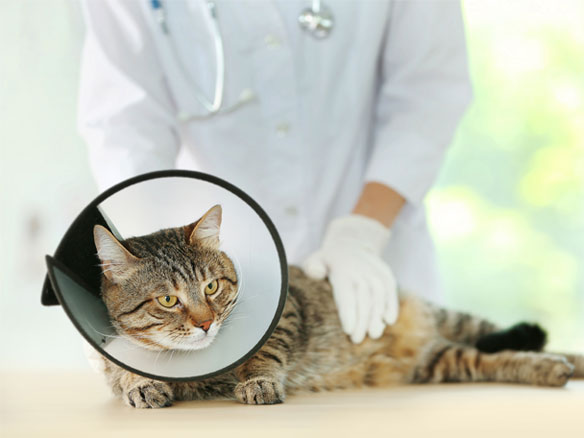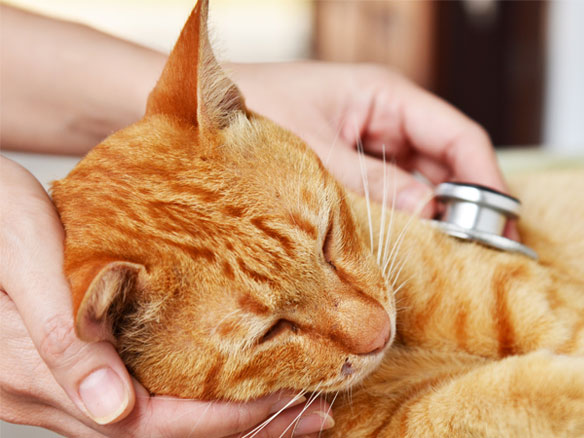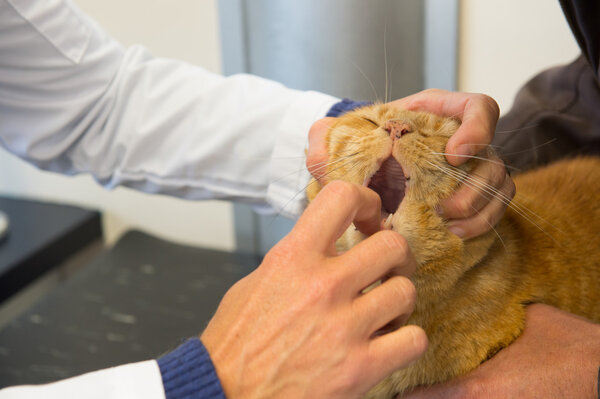27/10/2023
Coughing in cats is not unusual. If you own multiple feline companions, you may even observe occasional dry coughing from them. Coughing may indicate that your cat needs to expel something from within, or it could be a symptom of disease. Therefore, it is essential to understand the several reasons behind cat coughing.
In this article, you will find an overview of the causes, treatments, and other things to watch when your feline friend starts to cough.
Read on to learn about some common causes of coughing in cats and gain some tips to ensure good pet health.

Why do cats cough?
Coughing is a common reason why cats visit the vet. It can be alarming to see your little feline friend with their back arched and making that hacking noise. There is a myriad of different causes of cat coughing—some are serious, and some are not.
The most common cause for your coughing cat is hairballs, especially if they have very long air that could have been ingested when grooming, which some might have difficulty with expelling. Another thing you should take note of is the dust and irritants in your household that might also trigger coughing in cats.

Causes
Perhaps you may have noticed other signs of discomfort in your pet, such as weight loss, reduced appetite, and persistent cough. It is then crucial to take your cat to the vet immediately so your feline friend can get the medical attention they need and ease any discomfort caused by your cat's cough.
Allergies
Allergies are a prevalent issue for humans, but did you know that cats can also be allergic? Your cat's environment, food, or other substances in the household can all possibly trigger your cat's allergic reactions.
Here are a few symptoms:
- coughing, wheezing, and sneezing
- vomiting or diarrhoea
- runny eyes
- snoring
- swollen paws
- ear infection
- excessive licking and scratching
Asthma
Feline asthma is similar to asthma in humans. It is an inflammatory disease of the lower respiratory tract that causes asthma attacks that can cause discomfort and be life-threatening to your cat.
It is important to note that while coughing is one of the more apparent signs of asthma affecting the lower airways, not all cats will exhibit coughing as a symptom. Aside from cat cough, here are a few signs of feline asthma that you should also observe:
- difficulty or rapid breathing
- wheezing
- open mouth breathing
- vomiting
While asthma is a chronic inflammatory condition, responsible pet care can ease the discomfort of cat cough.
Heartworms
When mosquitoes bite your cat, they can leave behind more than an itchy bump. A mosquito bite can lead to a heartworm infestation.
Cats are not natural hosts for heartworms - this means that they can become infected with heartworms, although it is rare for them to develop a full-blown infestation. However, both indoor and outdoor cats are equally susceptible to heartworm disease.
If you notice any of these symptoms, you should consider taking your cats to the vet so your cat can undergo blood tests and x-rays to see any signs of parasitic worms.
- cat coughing and gagging
- vomiting
- diarrhoea
- difficulty breathing
- lethargy
- loss of appetite
- weight loss
Ingestion of foreign objects
Another possible cause of your cat's cough is the accidental ingestion of foreign material that can get lodged in the cat’s throat due to grooming or objects lying around the house.
It can be a small piece of plastic, a clump of sand from cat litter, or even thread from a toy. Pet parents must look out for small items that your cat might accidentally ingest.
If you notice your cat's coughing getting worse along with these symptoms, you should check with your vet for immediate care to ease your cat's discomfort:
- cat coughing and hacking
- vomiting
- diarrhoea
- loss of appetite
- changes in behaviour
- lethargy
- straining to defecate
- abdominal tenderness
- pawing at the face or mouth
Lung cancer
If your cat is coughing excessively, it can be a frightening sight for pet owners. While there are many different causes of cats coughing, it can also signify lung cancer. In worst case scenarios, they may have developed lung cancer from exposure to carcinogenic substances such as cigarette smoke.
Fortunately, the development of veterinary medicine can treat your cat's condition if the disease is detected early. Therefore, you must be observant of these signs to treat your fur-friend immediately:
- cough
- gradual loss of weight
- difficult and rapid breathing
- fever
- cat coughs blood
- changes in behaviour (excessive meowing and hiding)
- lethargy
- vomiting
These symptoms vary depending on the type of cancer affecting your cat, which refers to primary lung tumors and metastatic lung tumors.
Pneumonia
Pneumonia is one of the inflammatory conditions that is also a suspected cause of coughing, which causes much discomfort to your cat. The following reasons may cause this respiratory infection:
- bacterial infection
- inhalation of foreign material
- fungal infections
- parasitic infection
It is not easy to diagnose pneumonia in your cat, but here are some signs and symptoms to take note of:
- shallow breathing
- dry cough
- wet cough (due to mucus or blood)
- fever
- rattling sounds
- bluish mouth
- fever
- nasal discharge
- losing weight
- lack of appetite
- lethargy
Respiratory Infections
A cough is a reflex that aids in clearing the airways of irritants or other foreign bodies. It can be caused by several different issues, including heart disease, parasites, asthma and allergies, but the most common cause is a respiratory infection.
Respiratory tract infections in your fur friends are often caused by viruses—though bacterial infections can also occur.
Cats who have respiratory infections may develop these symptoms:
- cough
- sneezing
- runny nose
- fever
- drooling
- nasal and/or oral ulcers
- nasal and eye discharge
- congestion in nasal passages
- hoarse voice (due to affected voice box)
Pleural effusion
The abnormal fluid build-up in a cat's chest is also one reason for excessive coughing caused by several underlying diseases, including heart failure.
Depending on the cause, it can be a minor problem that resolves itself with no intervention or a sign of a severe complication.
Symptoms of the abnormal build-up of fluid in your cat's chest include:
- cough
- difficulty or rapid breathing
- open-mouthed breathing
- lack of energy and appetite
- bluish to purplish skin colour
- unusual behaviour
Treatments
Treatment depends on your feline companion's condition, but veterinary professionals might suggest cough suppressants to treat the cough symptomatically to address the discomfort of coughing.
However, if the cough persists and cough suppressants are not helping much, your cat would need to undergo diagnostic tests to assess diseases early on and avoid leading to a critical situation like heart failure.
Conclusion
Although it is normal for cats to cough, it can still be concerning for pet owners. The severity and intensity also varies from cat to cat; some have chronic coughing fits, while others have the occasional cough.
The best thing to do with a coughing cat is to take them to the vet regularly and observe other symptoms that your cat may be experiencing. It can help your vet narrow down the underlying cause of your cat's cough. Make sure to insure your pet so they can receive the best possible care.
Disclaimer: The information provided in this article is for general information only and is not intended to provide a complete descriptions of all terms, exclusions, and conditions applicable to every insurance product or service offered by Liberty Insurance. Liberty Insurance makes no representations or warranties of any kind whatsoever that the information and materials contained on our website are suitable for your needs, are complete, timely, reliable, or are free from errors, inaccuracies or typographical mistakes. Please refer to our website terms and conditions (Terms and Conditions | Liberty Insurance Singapore) for the terms of use and refer to the policy wordings of the products for more details on the relevant terms and conditions


